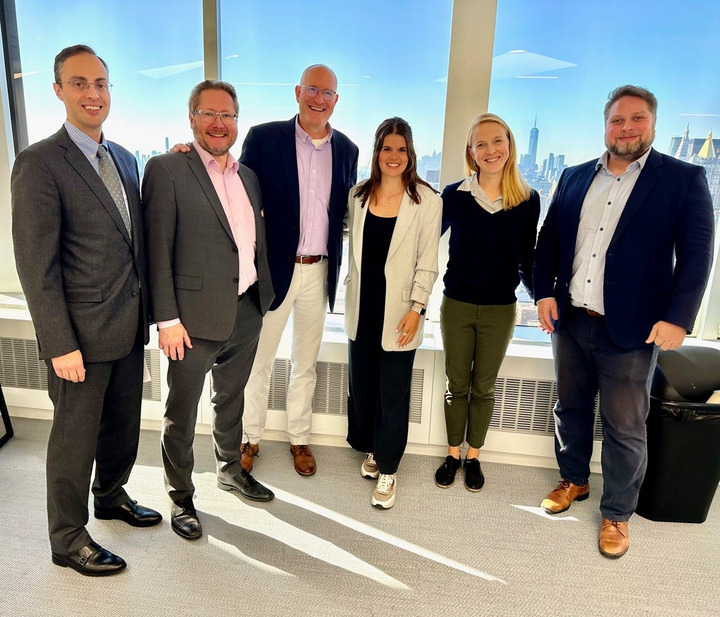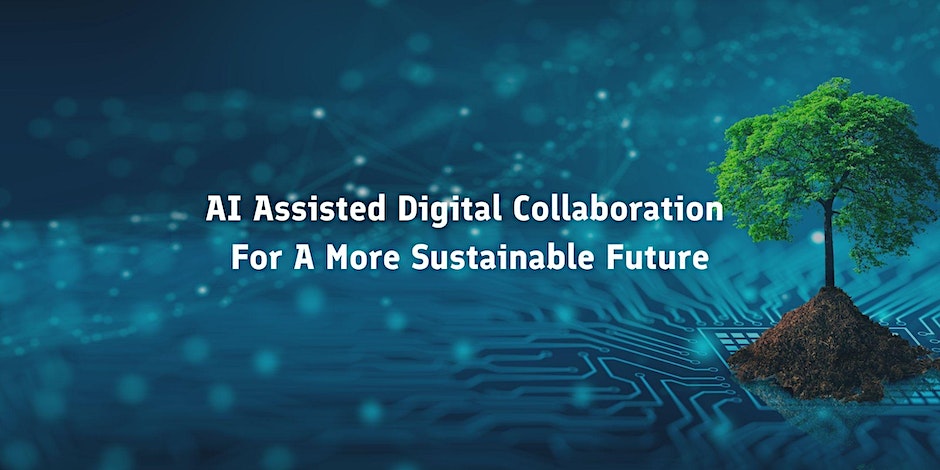Organizations face diverse sustainability challenges, largely dependent on supply chain complexity and capital accessibility. To accelerate sustainability efforts, they will need to work on verifiable claims of net-zero or net negativity, which could command premiums in the market. Digitalization and AI are recognized as game-changers, offering powerful tools for data collection, reporting, and problem-solving.
Hosted in collaboration by Inclus and the Consulate General of Finland in New York, a panel discussion on the topic of ”AI Assisted Digital Collaboration for a More Sustainable Future” gathered together three seasoned experts for an insightful discussion on the role of digitalization and AI in sustainability.
Their discussion focused on challenges in sustainability and the role of digitalization and AI in addressing them. The panel also highlighted the potential for AI to reshape sustainability efforts and drive a more environmentally responsible future. We were happy to have with us:

Mikaeli Langinvainio

Craig Jonas

Dalai Fazio
Key Challenges in Sustainability Efforts
Discussed in the event was that the key challenges organizations face in their sustainability efforts are contingent on the organization’s structure and control over supply chains. Essentially, complex supply chains can impede effective sustainability management. As a result, implementing Sustainable Development Goals (SDGs) or net-zero recommendations may be beyond the reach of many organizations.
To expedite sustainability efforts, if was suggested that organizations should aim at moving up the value chain and establishing trust systems for verifiable net-zero or net negativity claims, allowing for premium pricing on sustainable products.
A significant challenge lies in the accessibility and flow of capital. Traditional cost calculations often prove inaccurate, causing issues. There’s an emphasis on the urgency of the situation, given the limited time available and the imperative need for active engagement to achieve sustainability goals.
The importance of integrating sustainability into all aspects of an organization was highlighted by the panel. The economic significance of sustainability and the requirement for specialized expertise to drive sustainability initiatives effectively were underscored.
Digitalization’s Role in Sustainability
The panel also discussed the role of digitalization in advancing sustainability efforts.
Digital collaboration, AI, and data collection and reporting play a pivotal role in developed economies and large organizations. The potential of AI and digital tools to benefit smaller firms and communities was underscored. These tools, exemplified by entities like Inclus, offer valuable data for sustainability efforts, emphasizing the importance of considering local context and human interaction in their effective deployment.
“AI can serve as an equalizer in communities and facilitate significant leaps in digitalization. Estonia serves as an example, having transformed itself through digitalization, driven by young leaders.”
Mikaeli Langinvainio
The utilization of AI to filter and identify otherwise overlooked opportunities was brought up by the panel. AI’s role in ensuring that organizations do not miss critical sustainability opportunities was emphasized.
AI’s role as an equalizer in communities and a catalyst for substantial digitalization leaps was also discussed. Estonia’s transformation through digitalization, driven by young leaders, was mentioned as a notable example of this potential.
AI’s Practical Applications
The discussion also delved into practical applications of AI in sustainability efforts.
It was acknowledged by the panel that AI has the potential to fill gaps in human thinking and process extensive stakeholder data. It can also offer suggestions for risk mitigation and easily retrieve industry or company-specific data.
AI can be harnessed to enhance meeting efficiency by automating note-taking and encouraging increased participation. Additionally, as the panel discussed, it aids in content creation, expediting progress.
Examples of AI applications in conservation and infrastructure planning were also shared; AI can identify species, detect illegal deforestation, and optimize the placement of solar panels and battery storage, making these efforts more efficient and cost-effective.
“AI is a great assistant; it can neatly fill gaps in human thinking and process large amounts of data. It can also provide mitigation suggestions for risks and retrieve industry or company-specific data.”
Mikaeli Langinvainio

Audience Insights
The panel audience, too raised several important points, such as the following.
Consumer Education: It is important to empower consumers with knowledge about the sustainability of products through labeling and trusted scores. This can drive significant shifts in customer spending and choice.
Business Decision: The need to convince everyone that caring about the world is a good business decision was emphasized. Access to information and awareness is crucial in driving change.
Role of Universities: An audience member highlighted the need for universities to include sustainability themes in their curriculum and encouraged discussions on sustainability for a broader perspective.
Evaluating Risks and Brand Management
Questions were raised from the audience about evaluating risks and brand management in the context of anti-ESG backlash in the USA.
The panel then discussed the significance of reputation risk assessment and the involvement of experts from diverse units in evaluating risks and opportunities within companies. The emphasis was placed on fostering a dialogue and understanding the company’s position in the market.
A distinction was noted between individuals who believe in climate change and ESG principles and those who do not. The importance of rephrasing questions and emphasizing the considerable advantages of sustainability was highlighted. The opportunity costs of inaction, which frequently exceed the costs of taking action, were also pointed out.
In summary, the panel discussion provided valuable insights into the challenges and opportunities in sustainability efforts and highlighted the potential of AI and digital collaboration in achieving a more sustainable future.



